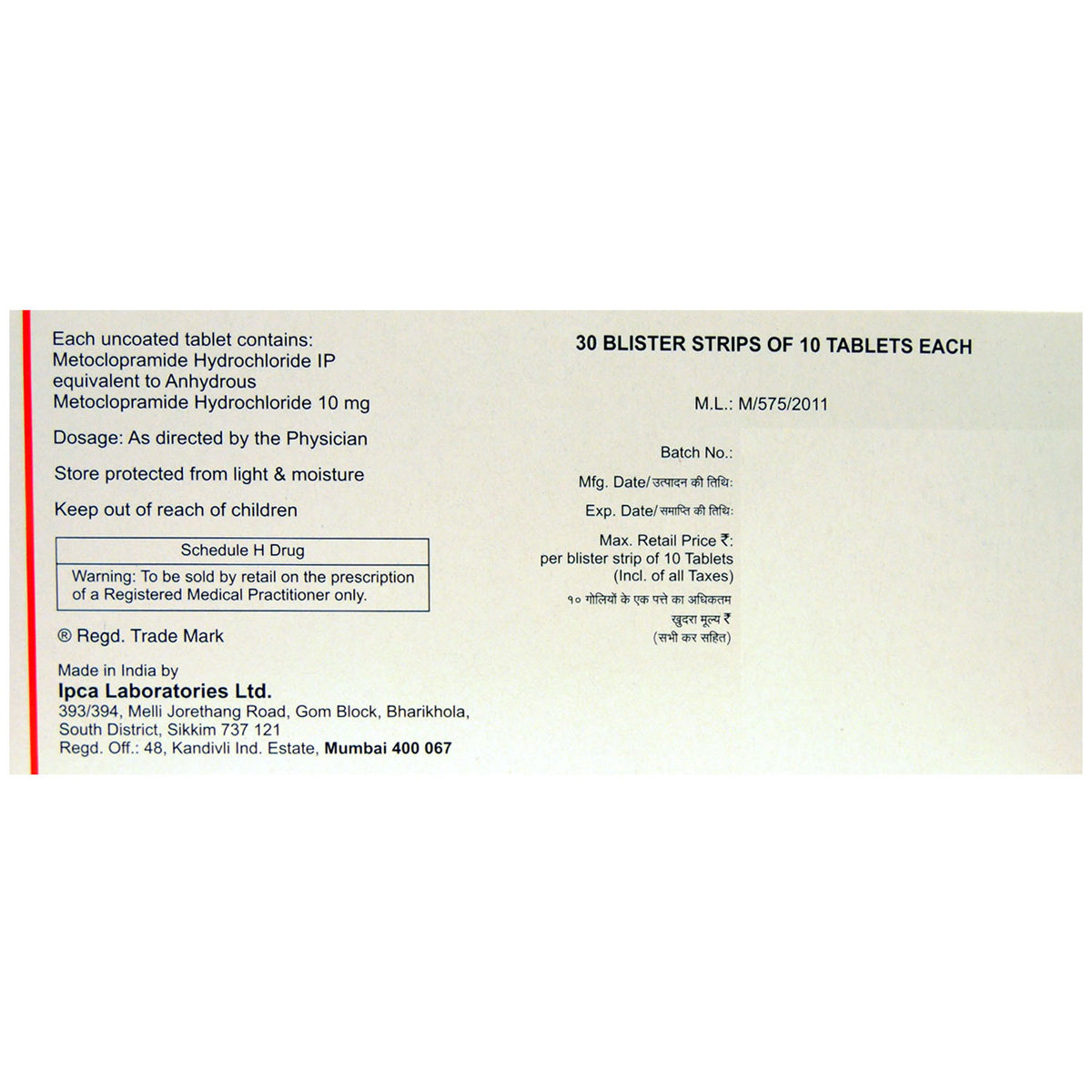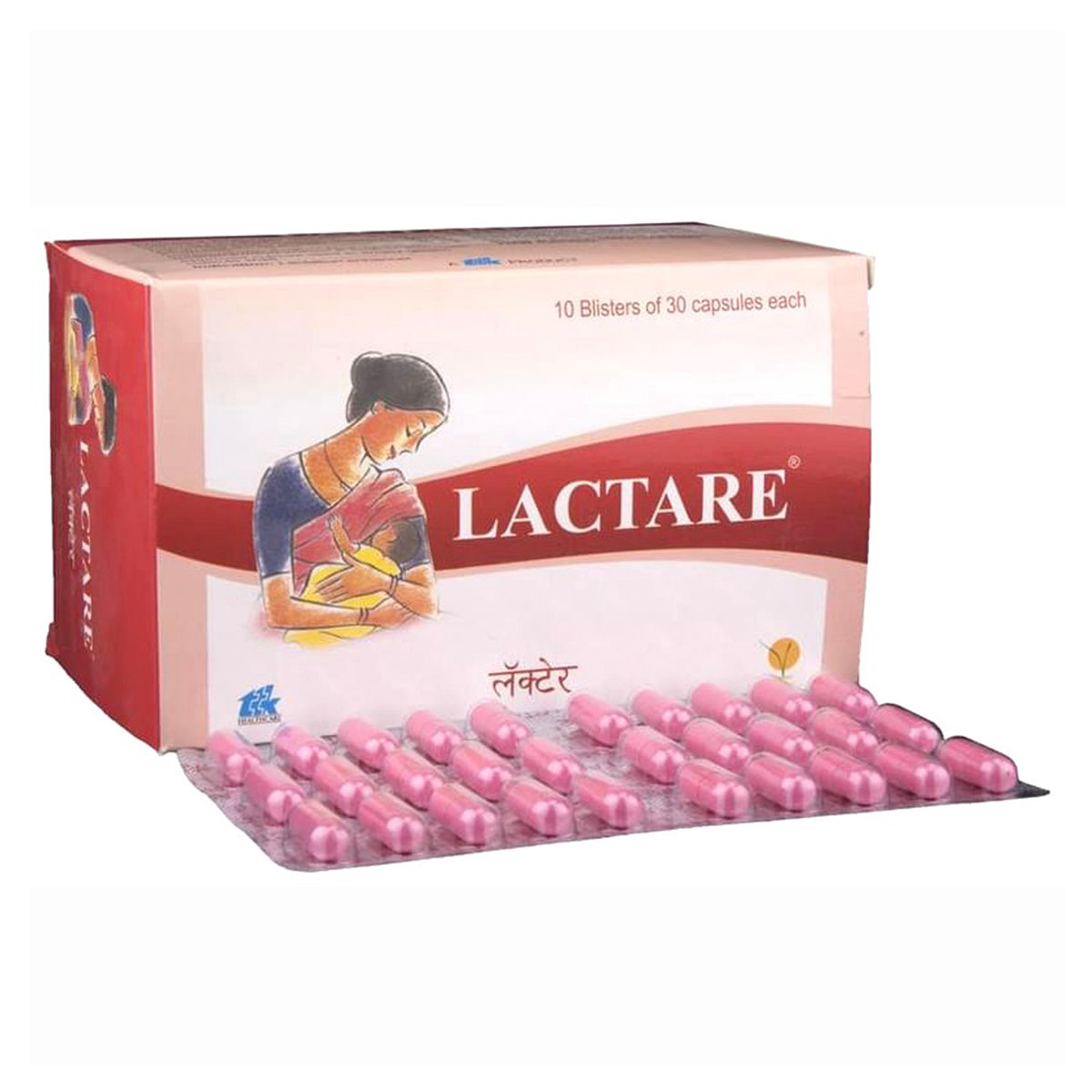Perinorm Tablet 10's
MRP ₹14
(Inclusive of all Taxes)
₹2.1 Cashback (15%)
Know Your Delivery Time
Provide Delivery Location

Secure Payment

India's Most Trusted Pharmacy

Genuine Products
Composition :
Manufacturer/Marketer :
Consume Type :
Return Policy :
Expires on or after :
NPPA :
About Perinorm Tablet
Perinorm Tablet is used to prevent nausea and vomiting caused by chemotherapy, radiotherapy, and which might occur after migraine. Additionally, Perinorm Tablet is also used to treat gastro-oesophageal reflux disease (GERD), diabetic gastroparesis (delayed gastric emptying in people with diabetes), heartburn, ulcers and sores in the oesophagus.
Perinorm Tablet contains ‘metoclopramide’ that works by increasing the motility of the upper gastrointestinal tract; this allows faster transit of food and reduces the symptoms of GERD and gastric emptying. It also works on the part of the brain that controls vomiting, thereby helping in preventing nausea and vomiting.
In some cases, Perinorm Tablet may cause common side effects such as restlessness, fatigue, drowsiness, diarrhoea, weakness, and lassitude (lack of energy). Most of these side effects do not require medical attention and will resolve gradually over time. However, you are advised to talk to your doctor if the side effects persist or worsen.
Do not take Perinorm Tablet for more than 3 months as it might increase the risk of tardive dyskinesia (movement disorder). Consult your doctor before taking Perinorm Tablet if you are pregnant or breastfeeding. Perinorm Tablet may cause drowsiness and dizziness, so avoid driving until you know how Perinorm Tablet affects you. Avoid consuming alcohol along with Perinorm Tablet as it could lead to increased drowsiness. Keep your doctor informed about your health condition and medications to rule out any interactions.
Uses of Perinorm Tablet
Perinorm Tablet is used in the prevention of Nausea, Vomiting, gastroesophageal reflux disease (GERD), and diabetic gastroparesis (delayed gastric emptying in people with diabetes). The detailed uses of Perinorm Tablet are as follows:
- Nausea Relief: Perinorm Tablet is frequently used to treat nausea brought on by a number of illnesses, such as those brought on by stress, anxiety, or digestive problems.
- Control of Vomiting: The suspension works well to stop and control vomiting, particularly in individuals who are having chemotherapy, surgery, or motion sickness.
- Gastrointestinal Disorders: It can be used to alleviate the symptoms of illnesses like gastritis or gastroenteritis and cure nausea associated with gastrointestinal disorders.

Have a query?
Directions for Use
- Perinorm Tablet can be taken 30 minutes before food, preferably at bedtime or as advised by the doctor.
- Follow your doctor's instructions on the dosage and timing of this medication
- Swallow Perinorm Tablet as a whole with a glass of water.
- Do not crush, break, or chew it.
Medicinal Benefits
Perinorm Tablet belongs to a group of medicines called anti-emetics and prokinetic agents used to prevent nausea and vomiting caused by chemotherapy and radiotherapy, which might occur after migraines. Additionally, Perinorm Tablet is also used to treat gastro-oesophageal reflux disease (GERD), diabetic gastroparesis (delayed gastric emptying in people with diabetes), heartburn, ulcers and sores in the oesophagus. Perinorm Tablet contains ‘metoclopramide’ that works by increasing the motility of the upper gastrointestinal tract; this allows faster transit of food and reduces the symptoms of GERD and gastric emptying. It also affects the dopamine receptor in the brain and gut, thereby helps in preventing nausea and vomiting.
How Perinorm Tablet Works
Storage
- Stretching and walking are examples of mild exercises that can improve mobility and reduce muscle stiffness.
- Improving posture, mobility, and muscle coordination through physical therapy can help manage slowness or stiffness.
- Maintain healthy weight and advance general health depend on eating a balanced diet.
- Reducing symptoms like tremors or muscle spasms requires adequate sleep and rest.
- Rest well; get enough sleep.
- Eat a balanced diet and drink enough water.
- Manage stress with yoga and meditation.
- Limit alcohol and caffeine.
- Physical activities like walking or jogging might help boost energy and make you feel less tired.
- Restlessness is related to mental health and needs medical attention if it's severe.
- Regular practice of meditation and yoga can help calm your mind. This can reduce restlessness.
- Prevent smoking as it can impact your calmness of body and mind.
- Talk to your friends and family about restlessness, who can provide a solution for why you feel restless.
- Get sufficient sleep for a minimum of 6-7 hours to reduce restlessness.
- Avoid driving or operating machinery or activities that require high focus until you know how the medication affects you.
- Maintain a fixed sleeping schedule, create a relaxing bedtime routine and ensure your sleeping space is comfortable to maximize your sleep quality.
- Limit alcohol and caffeine as these may worsen drowsiness and disturb sleep patterns.
- Drink plenty of water as it helps with alertness and keeps you hydrated and for overall well-being.
- Moderate physical activity can improve energy levels, but avoid intense workouts right before bedtime.
- Hydrate your body: Drink enough water to prevent dehydration and headaches.
- Calm Your Mind: Deep breathing and meditation can help you relax and relieve stress.
- Rest and Recharge: Sleep for 7-8 hours to reduce headache triggers.
- Take rest: lie down in a quiet, dark environment.
- Cold or warm compresses can help reduce tension.
- Stay Upright: Maintain good posture to keep symptoms from getting worse.
- To treat headaches naturally, try acupuncture or massage therapy.
- Over-the-counter pain relievers include acetaminophen and ibuprofen.
- Prescription Assistance: Speak with your doctor about more substantial drug alternatives.
- Severe Headaches: Seek emergency medical assistance for sudden, severe headaches.
- Frequent Headaches: If you get reoccurring headaches, consult your doctor.
- Headaches with Symptoms: Seek medical attention if your headaches include fever, disorientation, or weakness.
- Inform your doctor about dizziness symptoms. They may adjust your medication regimen or prescribe additional medications to manage symptoms.
- Follow your doctor's instructions for taking medication, and take it at the same time every day to minimize dizziness.
- When standing up, do so slowly and carefully to avoid sudden dizziness.
- Avoid making sudden movements, such as turning or bending quickly, which can exacerbate dizziness.
- Drink plenty of water throughout the day to stay hydrated and help alleviate dizziness symptoms.
- If you're feeling dizzy, sit or lie down and rest until the dizziness passes.
- Track when dizziness occurs and any factors that may trigger it, and share this information with your doctor to help manage symptoms.
- Avoid driving or operating machinery or activities that require high focus until you know how the medication affects you.
- Maintain a fixed sleeping schedule, create a relaxing bedtime routine and ensure your sleeping space is comfortable to maximize your sleep quality.
- Limit alcohol and caffeine as these may worsen drowsiness and disturb sleep patterns.
- Drink plenty of water as it helps with alertness and keeps you hydrated and for overall well-being.
- Moderate physical activity can improve energy levels, but avoid intense workouts right before bedtime.
What if I have taken an overdose of Perinorm Tablet
Drug Warnings
Do not take Perinorm Tablet if you are allergic to any of its contents; if you have bleeding or obstruction in the stomach, tardive dyskinesia (movement disorder), pheochromocytoma (tumour in the adrenal glands), or epilepsy. Talk to your doctor before taking Perinorm Tablet if you have heart problems, diabetes, depression, high blood pressure, breast cancer, seizures, liver or kidney problems, Parkinson’s disease, methaemoglobinaemia; if you are taking levodopa or if you have gastrointestinal surgery in the last 3-4days. Do not take Perinorm Tablet for more than three months as it might increase the risk of tardive dyskinesia; the risk increases if you are older, especially if you are an older woman or if you have diabetes. Consult your doctor immediately if you cannot stop or control movements like shaking your arms and legs, blinking and moving your eyes, sticking out the tongue, frowning, lip-smacking, chewing, or puckering up the mouth.
Drug-Drug Interactions
Drug-Drug Interactions
Login/Sign Up
Coadministration of Perinorm Tablet with duloxetine increase the risk of serotonin syndrome(a condition in which a chemical called serotonin increase in your body).
How to manage the interaction:
Taking Perinorm Tablet with Duloxetine is not recommended, they can be taken together if prescribed by a doctor. However, consult a doctor if you experience any unusual symptoms. Do not discontinue any medications without consulting a doctor.
Co-administration of Perinorm Tablet with Maprotiline can increase the risk or severity of side effects.
How to manage the interaction:
Taking Maprotiline with Perinorm Tablet is generally avoided as it can possibly result in an interaction, it can be taken if your doctor has advised it. Consult your doctor if you see symptoms like dizziness, drowsiness, confusion, difficulty concentrating, or impairment in thinking, judgment, and motor coordination. Do not discontinue any medications without consulting a doctor.
Coadministration of Perinorm Tablet with quetiapine can increase the risk of side effects like uncontrolled movement disorder.
How to manage the interaction:
Taking Perinorm Tablet with Quetiapine is generally avoided as it can possibly result in an interaction. They can be taken together if advised by your doctor. However, contact a doctor if you experience any symptoms like muscle spasms or movements that you can't stop or control, such as lip smacking, chewing, teeth clenching, jaw twitching, blinking, eye-rolling, shaking or jerking of arms and legs, tremor, restlessness, pacing, and foot tapping. Do not stop taking any medications without consulting a doctor.
Co-administration of Perinorm Tablet with Clozapine can increase the risk of side effects.
How to manage the interaction:
Taking Perinorm Tablet with Clozapine is generally avoided as it can possibly result in an interaction, it can be taken if your doctor has advised it. Do not discontinue any medications without consulting a doctor.
The combination of Lurasidone and Perinorm Tablet may result in significantly increased Lurasidone blood levels. This may raise the possibility of undesirable consequences such as Parkinson's disease. (It is a neurological condition that causes uncontrollable movements)and Tardive dyskinesia (uncontrollable movements, particularly of the lower face).
How to manage the interaction:
Lurasidone and Perinorm Tablet is not recommended, as they may interact, but can be used if a doctor prescribes them. Consult a doctor if you have muscle spasms, or movements that you can't stop or control, such as lip smacking, chewing, puckering, frowning, tongue thrusting, teeth clenching, jaw twitching, jitteriness, restlessness, pacing, and foot tapping. Do not stop taking any medications without visiting a doctor.
Coadministration of Fluvoxamine with Perinorm Tablet increases the risk of serotonin syndrome(a condition in which a chemical called serotonin increases in your body).
How to manage the interaction:
Taking Fluvoxamine with Perinorm Tablet is not recommended, as it can lead to an interaction, it can be taken if prescribed by your doctor. Do not stop using any medications without a doctor’s advice.
Co-administration of Perinorm Tablet with Trifluoperazine can increase the risk of side effects like uncontrolled movement disorder.
How to manage the interaction:
Taking Perinorm Tablet with Trifluoperazine is generally avoided as it can possibly result in an interaction, it can be taken if your doctor has advised it. However, if you experience muscle spasms or movements that you can't stop or control, such as lip smacking, chewing, puckering, frowning or scowling, tongue thrusting, teeth clenching, jaw twitching, blinking, eye-rolling, shaking or jerking of arms and legs, tremor, jitteriness, restlessness, pacing, and foot tapping., contact your doctor immediately. Do not discontinue any medications without consulting a doctor.
Coadministration of Perinorm Tablet with Promethazine can increase the risk of side effects like uncontrolled movement disorder.
How to manage the interaction:
Taking Promethazine with Perinorm Tablet is generally avoided as it can possibly result in an interaction. They can be taken together However, consult a doctor if you experience puckering, frowning or scowling, tongue thrusting, teeth clenching, jaw twitching, blinking, eye-rolling, shaking or jerking of arms and legs, tremor, jitteriness, restlessness, pacing, and foot tapping. Do not stop taking any medications without consulting a doctor.
Co-administration of Perinorm Tablet with Aripiprazole can increase the risk of side effects.
How to manage the interaction:
Taking Aripiprazole with Perinorm Tablet is generally avoided as it can result in an interaction, it can be taken if a doctor has advised it. Do not discontinue any medications without consulting a doctor.
Taking Perinorm Tablet with Ziprasidone can increase the risk of side effects like uncontrolled movement disorder.
How to manage the interaction:
Taking Perinorm Tablet with Ziprasidone is not recommended, but it can be taken together if prescribed by a doctor. However, consult your doctor if you experience lip-smacking, chewing, puckering, frowning or scowling, tongue thrusting, teeth clenching, jaw twitching, blinking, eye-rolling, shaking or jerking of arms and legs, tremor, jitteriness, restlessness, pacing, and foot tapping. Do not discontinue any medications without consulting a doctor.
Drug-Food Interactions
Drug-Food Interactions
Login/Sign Up
Diet & Lifestyle Advise
- Eat smaller meals more often.
- Drink fluids to stay hydrated.
- Avoid solid foods until vomiting stops.
- Avoid foods that might cause stomach upset.
- Take ample rest. Avoid any activity immediately after eating.
- Consume plain, light foods such as bread and biscuits.
- Avoid food with strong flavours and fried food.
- Ginger tea might help in proper digestion.
Habit Forming
Therapeutic Class
All Substitutes & Brand Comparisons
RX
Out of StockDysvon 10mg Tablet
₹6.37
(₹0.57 per unit)
54% CHEAPERRX
Out of StockGastrinorm 10mg Tablet
₹7
(₹0.63 per unit)
50% CHEAPERRX
Out of StockReggi 10mg Tablet
A. Menarini India Pvt Ltd
₹7.04
(₹0.63 per unit)
50% CHEAPER
Alcohol
Unsafe
Avoid consumption of alcohol while taking Perinorm Tablet as it may make some side effects worse such as increased sleepiness and drowsiness.
Pregnancy
Consult your doctor
Consult your doctor before taking Perinorm Tablet if you are pregnant; your doctor will prescribe only if the benefits outweigh the risks.
Breast Feeding
Consult your doctor
Consult your doctor before taking Perinorm Tablet if you are breastfeeding.
Driving
Unsafe
Perinorm Tablet may cause dizziness, drowsiness and fatigue. Do not drive or operate machinery until you know how Perinorm Tablet affects you.
Liver
Caution
Dose adjustment may be needed. Consult your doctor before taking Perinorm Tablet if you have a liver impairment or any concerns regarding this.
Kidney
Caution
Dose adjustment may be needed. Consult your doctor before taking Perinorm Tablet if you have kidney impairment or any concerns regarding this.
Children
Caution
Perinorm Tablet are not recommended for children due to the risk of tardive dyskinesia, extrapyramidal symptoms as well as risk of methemoglobinemia in neonates.
Heart
Caution
Perinorm Tablet should be administered with caution in patients with heart problems. Please inform your doctor about any existing heart problems before using Perinorm Tablet .
Geriatrics
Caution
Perinorm Tablet should be administered with caution in elderly patients. If you have any concerns, please consult your doctor.
FAQs
Perinorm Tablet belongs to a group of medicines called anti-emetics and prokinetic agents used to prevent nausea and vomiting caused by chemotherapy and radiotherapy, which might occur after migraines. Perinorm Tablet is also used to treat gastro-oesophageal reflux disease (GERD), diabetic gastroparesis (delayed gastric emptying in people with diabetes), heartburn, ulcers and sores in the oesophagus.
Perinorm Tablet works by increasing the motility of the upper gastrointestinal tract; this allows faster transit of food and reduces the symptoms of GERD and gastric emptying. It also works on the part of the brain that controls vomiting, thereby helps in preventing nausea and vomiting.
Take Perinorm Tablet only for as long as the doctor has prescribed it for you. Do not take Perinorm Tablet for more than three months as it might increase the risk of tardive dyskinesia (movement disorder), which is often irreversible. The risk of developing tardive dyskinesia increases with the total dosage and duration of treatment.
Diarrhoea might be a side-effect of Perinorm Tablet . Drink enough fluids and eat non-spicy food if you experience diarrhoea. Consult your doctor if the condition persists or worsens.
Maintain a minimum gap of 6 hours between each dose. Do not take another dose of Perinorm Tablet even in case of vomiting and rejection of dose to avoid an overdose.
Perinorm Tablet may cause uncontrollable movements such as shaking, tics, twisting movements, muscle stiffness and rigidity. Consult your doctor if you experience these symptoms.
Take Perinorm Tablet 30 minutes before food, preferably at bedtime or as advised by the doctor.
Before starting Perinorm Tablet , inform the doctor if you have heart problems, diabetes, depression, high blood pressure, breast cancer, seizures, liver or kidney problems, Parkinson's disease, methemoglobinemia (blood disorder); if you are taking levodopa or if you have had gastrointestinal surgery in the last 3-4 days.
No, Perinorm Tablet should not be taken after meals. It works best when taken on an empty stomach.
Perinorm Tablet is not known to cause constipation. Drink enough fluids and eat fibre-rich food if you have constipation. Consult the doctor if the condition persists or worsens.
Perinorm Tablet is not indicated for the treatment of morning sickness. It is used to treat nausea, vomiting, gastroesophageal reflux disease (GERD), and diabetic gastroparesis (delayed gastric emptying in people with diabetes). Talk to the doctor if you have morning sickness; the doctor will prescribe appropriate medicine based on your condition.
Perinorm Tablet can be taken with ranitidine if prescribed by the doctor. No interaction has been reported between both these medicines.
Perinorm Tablet may cause side effects such as restlessness, fatigue, drowsiness, diarrhoea, weakness, and lassitude (lack of energy). Most of these side effects do not require medical attention and will resolve gradually over time. However, you are advised to talk to your doctor if the side effects persist or worsen.
Country of origin
Manufacturer/Marketer address
Disclaimer
Author Details
We provide you with authentic, trustworthy and relevant information
Reference
- https://www.medicines.org.uk/emc/files/pil.5880.pdf
- https://www.accessdata.fda.gov/drugsatfda_docs/label/2017/017854s062lbl.pdf
- https://www.nhs.uk/medicines/metoclopramide/
- https://www.drugs.com/metoclopramide.html
- https://medlineplus.gov/druginfo/meds/a684035.html
- https://www.drugs.com/cdi/metoclopramide-orally-disintegrating-tablets.html
- https://wellonapharma.com/product/finished/metoclopramide-hydrochloride-drops










